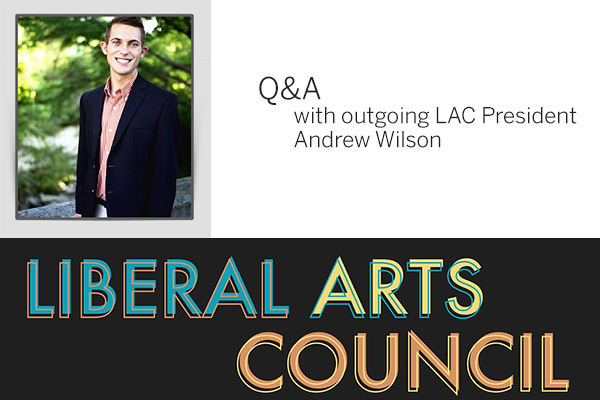Andrew Wilson, a Plan II Honors and history senior from Canton, Texas, has spent his final year at UT serving as president of Liberal Arts Council. He took the time to answer some questions about the LAC, why it’s important for liberal arts students to get involved and how the organization has changed during his term.
What is Liberal Arts Council?
Since 1979, the Liberal Arts Council has served as the official student voice for the College of Liberal Arts at UT Austin. Comprised of students with diverse majors and interests, LAC unites its members under the banner of representing and serving students. It accomplishes this goal by hosting various events aimed at professional development and academic enrichment for all liberal arts students. LAC also represents students as an official voting body in the overarching Senate of College Councils, a legislative student organization that addresses all academic concerns at the university.
Why should students get involved in LAC?
Through my four years as a member of LAC, I’ve learned how important it is to engage with your home college. My experiences in this organization taught me the inherent value of legislative organization and the true power of the student voice. LAC provides its members the opportunity to find a social niche within the university, develop invaluable leadership skills and effect genuine and significant change that benefits the college and university as a whole.
What do you think your biggest impact as president of LAC was? What are you most proud of?
Each spring, the newly elected leadership team crafts a vision for the organization. After my election last spring, we set a broad, long-term goal of increasing our presence within the college and throughout the university in order to better represent and serve students. As my term comes to an end, I can honestly say we accomplished that goal. Our team has worked tirelessly this year to professionalize the LAC and forge new relationships with other student organizations and administrative offices throughout the Forty Acres. Through this process, we have teamed with outside entities to develop innovative approaches to enriching the College of Liberal Arts, including the creation of a sustainable financial structure to provide free readership of the New York Times to liberal arts students. We also increased our presence in the Senate of College Councils, leading to an overall strengthening of the liberal arts voice.
How did serving at LAC president impact your life?
I have loved absolutely every minute spent as president of LAC, but I think my tenure in the organization over four years has had the most significant impact. It is rewarding to engage with administration and realize that they truly value the student opinion. From hosting a plethora of events for students to forging a partnership with the New York Times, the last four years were filled with incredible experiences. As president, getting to engage with external entities and seeing first-hand how students can make a difference on this campus has been truly rewarding. Most importantly, though, seeing how our organization crafts new leaders who go on to do amazing things for the university and society inspires me on a daily basis, and I am grateful to have served the college in this capacity.
What are your plans after graduation?
After leaving the Forty Acres, I plan to teach English in France for a year before applying to graduate school in comparative literature. My research interests include post-colonial immigrant populations and literature in France and England, which is a field I wish to pursue in graduate studies.
What’s your ideal career?
This question is one I have considered deeply over the last four years. Like any genuine liberal arts student, my career goals have varied greatly. I’ve gone from an aspiring attorney to diplomat to college professor. At this point, I definitely see myself entering academia, but I would say, in general, my ideal career is one that enriches and fulfills aspects of my life and allows me to do the same for others.
What has studying liberal arts meant to you? How has it changed and/or helped you?
Discussing 19th-century French literature, a professor once told me, “Societies progress, and progress is good.” Despite its simplicity, that statement impacted my approach to education. It was during that course that I gained a true understanding of the value of a liberal arts education. It gave me the skills necessary to appreciate and engage with the changing world around me. From French to philosophy to foreign relations, my liberal arts education constantly pushed me to think at a deeper level, expanded my intellectual horizons, and developed an insatiable appetite for knowledge. I developed a humanistic understanding of history and its impact on the modern world as I walked down the beaches of Normandy. I explored social issues when I studied immigrant literature at Oxford. All in all, I gleaned a skill set that is competitive beyond the job market. My liberal arts education makes me competitive in the marketplace of ideas, and ideas are the future. Playing on the UT cliché, I truly believe the ideas fostered in the College of Liberal Arts will change the world.
